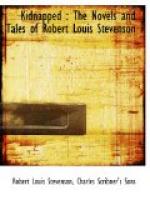He gave me the letter, which was addressed in these words: “To the hands of Ebenezer Balfour, Esquire, of Shaws, in his house of Shaws, these will be delivered by my son, David Balfour.” My heart was beating hard at this great prospect now suddenly opening before a lad of seventeen years of age, the son of a poor country dominie in the Forest of Ettrick.
“Mr. Campbell,” I stammered, “and if you were in my shoes, would you go?”
“Of a surety,” said the minister, “that would I, and without pause. A pretty lad like you should get to Cramond (which is near in by Edinburgh) in two days of walk. If the worst came to the worst, and your high relations (as I cannot but suppose them to be somewhat of your blood) should put you to the door, ye can but walk the two days back again and risp at the manse door. But I would rather hope that ye shall be well received, as your poor father forecast for you, and for anything that I ken come to be a great man in time. And here, Davie, laddie,” he resumed, “it lies near upon my conscience to improve this parting, and set you on the right guard against the dangers of the world.”
Here he cast about for a comfortable seat, lighted on a big boulder under a birch by the trackside, sate down upon it with a very long, serious upper lip, and the sun now shining in upon us between two peaks, put his pocket-handkerchief over his cocked hat to shelter him. There, then, with uplifted forefinger, he first put me on my guard against a considerable number of heresies, to which I had no temptation, and urged upon me to be instant in my prayers and reading of the Bible. That done, he drew a picture of the great house that I was bound to, and how I should conduct myself with its inhabitants.
“Be soople, Davie, in things immaterial,” said he. “Bear ye this in mind, that, though gentle born, ye have had a country rearing. Dinnae shame us, Davie, dinnae shame us! In yon great, muckle house, with all these domestics, upper and under, show yourself as nice, as circumspect, as quick at the conception, and as slow of speech as any. As for the laird—remember he’s the laird; I say no more: honour to whom honour. It’s a pleasure to obey a laird; or should be, to the young.”
“Well, sir,” said I, “it may be; and I’ll promise you I’ll try to make it so.”
“Why, very well said,” replied Mr. Campbell, heartily. “And now to come to the material, or (to make a quibble) to the immaterial. I have here a little packet which contains four things.” He tugged it, as he spoke, and with some great difficulty, from the skirt pocket of his coat. “Of these four things, the first is your legal due: the little pickle money for your father’s books and plenishing, which I have bought (as I have explained from the first) in the design of re-selling at a profit to the incoming dominie. The other three are gifties that Mrs. Campbell and myself would be blithe of your acceptance. The first, which is round,




